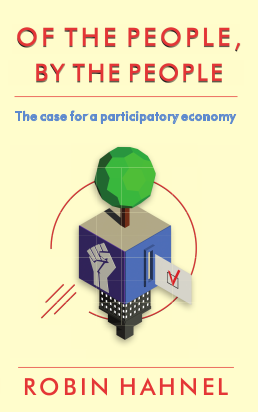Review: Of the People, By the People: The Case for a Participatory Economy

This is a review I wrote and originally posted on the Amazon page for the book "Of the People, By the People: The Case for a Participatory Economy" by Robin Hahnel.
Some of the greatest victories in the history of social activism have been those in defiance of the market -- the abolition of outright chattel slavery, the formal end of child labor, the establishment of a minimum wage and the eight-hour workday. Even the most notable social activist movement of our time, Occupy Wall Street, is also arguably a defiance of markets. And yet, openly calling for the abolition the institution of markets, indeed even articulating a critique as to their legitimacy, remains as taboo as any subject in our times. It's not because a case can't be made against markets. On the contrary, one can easily draw a list of indictments: markets ignore externalities (e.g., the mispricing of fossil fuels has encouraged their consumption whose effects will accelerate climate change and perhaps destroy civilization itself), markets spur antagonism between participants (at a time when we need to cooperate to find solutions to the pressing problems of our age, markets spur buyers against sellers and against one another), markets spawn the most hated and the most powerful institution of our time -- the limited-liability corporation. The "invisible hand" which has long served to justify markets is better replaced with the "invisible foot" of their effects and problems.
One big reason why this taboo still holds sway has been the longstanding absence of an alternative to markets, and the necessity for the forging of a viable AND humane alternative. "You can't fight something with nothing" writes Robin Hahnel in his most recent book "Of The People, By The People: The Case for a Participatory Economy." For more than 20 years, Robin Hahnel has advocated in various fora and many books the anti-corporate, anti-market, anti-command-planning (i.e., anti-communist) model of economics known as "parecon" (participatory economics). This book represents the latest effort to get the ideas behind the model to as wide an audience as possible -- what the model is, why it's needed, how it would works, why he think it can work in a viable and human manner in real life, and how the model can be implemented. The book has a lot going for it: Like all of Hahnel's books, it is very clearly written and persuasively argued. Plus, it is much shorter than Hahnel's previous works (it's only about 150 pages long) and full of many more pithy and quotable remarks sprinkled throughout the book which made it engaging to read. Many activists, or even folks who stumble upon the book in a book store or online, who might be intrigued by the cover but otherwise be turned away because of a book advocating participatory economics might be deemed too long or too technical can now find themselves spending -- dare I say it -- an enjoyable evening or two reading "Of the People, By The People".
This book represents the latest book-length presentation of the model of participatory economics, and therein lies one possible problem. Many who have read the literature on participatory economics may think that this is just another rehash of the same points. Having read the literature on parecon and having read this book, I would respond back: (1) Repeated messages that are worthy of being repeated need to be repeated if they're not being repeated elsewhere (and they almost certainly aren't regarding parecon, even among dissident media). (2) "Of The People, By The People" didn't feel to me like a rehash, a credit no doubt to the efforts to make this book as readable as possible for as wide an audience as possible.
Chapter 18 ("From Here To There") lists five areas of work necessary for making "system change" (the five areas are economic reform movements, experiments in equitable cooperation, electoral strategy, defending attacks, more concrete proposals). I myself would propose a sixth area -- the building and use of an independent media infrastructure which serve as a connective glue among all these efforts and as a rival to the corporate media (who, I should add, are increasingly leaving the game of what could be construed as journalism or even news coverage). Media are critical because, as recent research shows, you need to reach a 10% threshold in a population in order for an idea or notion (e.g, parecon) to take hold in a wider community. If that 10% threshold is not met, the idea will never take wider hold. It's debatable as to whether or not 10% of activists -- never mind the general public -- have even heard of participatory economics, putting aside if they agree with it and would take action around it. In order to reach that threshold, a media infrastructure will be necessary to help break the taboo of critiquing or abolishing markets.